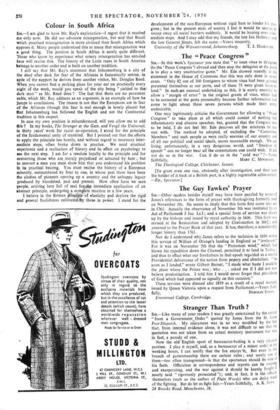, The 44 Peace Congress" Sin,—In this week's Spectator you
state that "to issue visas to delegates .(to the Peace Congress') abroad and then stop the delegates at the pens is to play a very unattractive game." Mr. Ede showed recently in his statement in the House c4 Commons that this was only done in se% en cases. "Only 82 out of 300 foreigners to whom visas had been granted presented themselves at our ports, and of these 75 were given leave to land." In such *n unusual undertaking as this, it is surely essential to allow a "margin of error" in the original grants of visas, which had to be corrected at the ports presumably because further information had come to light about these seven persons which made their entry undesirable.
One may legitimately criticise the Government for allowing a "Peace Congress" to Mice place at all which could consist of nothing but inflammatory and abusive speeches, but, granted that the Congress was to be held, I do not feel Mr. Ede deserves all the strictures he has met with. The method he adopted, of excluding the "Committee Members" and such people as were really enemies of our country and of all our political and social ideals, seems reasonable enough. We are living, unfortunately, in a very dangerous world, and" freedom of speech" can no longer bear all connotations one could wish. It did not do so in the war. Can it do so in the "cold war" ?—Yours faithfully, MARY C. MOORMAN. The Theological College, Chichester, Sussex.
[To grant even one visa, obviously after investigation, and then turn the holder of it back at a British port, is a highly regrettable achievement. —ED., Spectator.]














































































 Previous page
Previous page